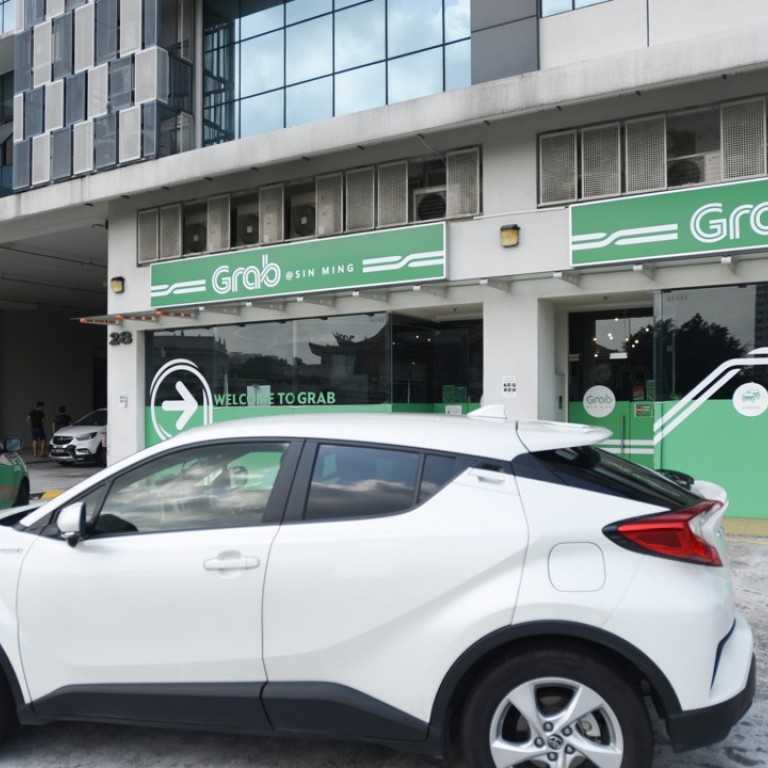
Singapore’s competition watchdog slaps Grab, Uber with US$9.5 million in fines over merger
Singapore’s antitrust watchdog on Monday said it would fine ride-hailing firms Grab and Uber a combined S$13 million (US$9.5 million) for anti-competitive behaviour as a result of their March merger, in spite of Grab’s insistence that the company did not intentionally breach competition laws.
The Competition and Consumer Commission of Singapore (CCCS) slapped Singapore-based Grab with a fine of around S$6.4 million, while Uber was penalised about S$6.6 million for violations of the competition act, according to a statement released by the watchdog. However, the companies have been spared from having to reverse the transaction.
The CCCS reiterated in a statement that Uber would not have left the Singapore market if the merger had not occurred. Prices for Grab’s services also increased after the merger, it found.
Grab, which was co-founded by chief executive Anthony Tan, acquired Uber’s Southeast Asian operations for an undisclosed sum in March this year, in return for giving Uber a 27.5 per cent stake in the Singapore-based firm. The merger effectively made Grab the dominant ride-hailing player in Singapore, with about 80 per cent market share.
“Mergers that substantially lessen competition are prohibited and CCCS has taken action against the Grab-Uber merger because it removed Grab’s closest rival, to the detriment of Singapore drivers and riders. Companies can continue to innovate in this market, through means other than anti-competitive mergers,” said CCCS chief executive Toh Han Li in a statement.
Grab’s exclusivity obligations on taxi companies, car rental partners and even some drivers also hampered smaller players from expanding in the ride-hailing market, CCCS found. Apart from financial penalties, CCCS also instructed that Grab remove any exclusivity arrangements it has with partners and maintain its pre-merger pricing algorithms and commission rates.
In a statement, head of Grab Singapore Lim Kell Jay insisted that it “did not intentionally or negligently breach competition laws” and that the company has not raised fares since the merger, in contrast with the CCCS’s findings.
However, the company agreed to abide by the penalties and remedies issued by the competition watchdog, including the removal of exclusivity arrangements.
“Grab agrees with, and has long advocated for, industry-wide regulations that allow drivers to freely choose which platform or operator they wish to drive with,” Lim said.
“Grab should not be the only transport player subjected to non-exclusivity conditions. This is inconsistent with taxi industry practices and we will continue our dialogue with the CCCS and the Land Transport Authority (LTA) to create a level playing field for all.”
Meanwhile, Uber expressed disappointment at the decision and said it was reviewing its options.
“We are disappointed by the CCCS decision announced today. We believe it is based on an inappropriately narrow definition of the market, and that it incorrectly describes the dynamic nature of the industry, among other concerns,” said Brooks Entwistle, Uber’s Chief Business Officer International. “We are reviewing the decision carefully and will consider our options, including an appeal.”
Indonesia’s Go-Jek, which said earlier this year that it will expand outside its home market to countries including Thailand, Vietnam, Philippines and Singapore, said that the company was “glad that the Commission has come to the same conclusion that we have – that new entrants into the market are facing a very high barrier to entry.”
“We’re encouraged to see the measures being taken to level the playing field – it will have a significant effect on our strategy and timeline,” Go-Jek said in a statement. “We are now confident that Singapore will have a robust, efficient and competitive market, and that our arrival will have a significantly positive impact on the lives of people in Singapore.”
Go-Jek recently launched its services in Vietnam with local partner Go-Viet, offering ride-hailing services, with food delivery and payment services to come later. It is also working with a local partner in Thailand to launch its ride-hailing services in the country soon, which will be called Get.

